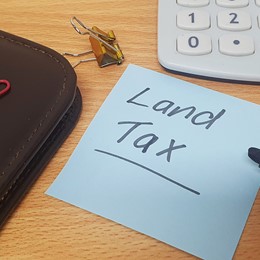Specialist Corporate and Commercial Lawyers
Table of Contents
Despite our Premier, Mr Dominic Perrottet, claiming that “when it comes to our economy and the biggest impediment on economic growth, the number one area for states is taxes”, it appears that land tax is here to stay. Property owners should be aware of how land tax provisions apply to their land holdings and how much it is going to cost them.
Land tax is calculated on the value of the land as determined by the Valuer General for the period of a calendar year. Each year, Revenue NSW increases the threshold rates for land, and the new threshold is applied to land holdings on 31 December each year. Land tax is applied for the full calendar year following the taxing date of 31 December, and no pro-rata calculation applies.
For those unfamiliar with how land tax is calculated, or for those who need a refresher, we have summarised some key information which may be useful.
Land tax generally applies to those who own, or jointly own, a property above a certain land value threshold that is not their main place of residence and is not exempt. Land value is the unimproved value of your land. You may be entitled to certain concessions exemptions such as the principal place of residence exemption.
Your land value can be found on the website of the Valuer General, using their land value search tool.
The general threshold has been increased to $822,000.00. The general rate is $100.00 plus 1.6% of the land value above the threshold, up to the premium rate. If, for example, the total of your land holdings (excluding any exempt properties) is $950,000.00 your land tax in 2022 is estimated to be $2,148.00.
The premium threshold has been increased to $5,026,000.00. The premium rate is $67,364.00 plus 2% of land value above the threshold. If, for example, the total of your land holdings (excluding any exempt properties) is $7,500,000.00 your land tax in 2022 is estimated to be $116,844.00.
Revenue NSW intends to issue 2022 Land Tax Notices of Assessment between 5 January 2022 through to mid-February. If you have not verified your email address with Revenue NSW, the Notice of Assessment will be sent to your postal address. If you need to update any of your details, including changing a principal place of residency exemption, you should login to Land Tax Online and complete this prior to the Notice of Assessment being issued.
The NSW Government undertook a significant compliance program in relation to land tax in the 2020-2021 land tax year with the following results:
- it investigated 3,877 landholders who did not pay land tax surcharge and identified $69.3 million in additional land tax surcharge;
- it investigated 23,374 landholders who were not assessed for land tax or had incorrect exemptions applied, and identified $244.7 million in additional land tax: and
- it investigated over 2,013 customers that were not assessed for parking space levy or had incorrect exemptions applied and identified $12.3 million in additional Parking Space Levy.
The failure to pay land tax can result in interests and fines being imposed.
The non-payment of land tax can also cause a problem when a property owner attempts to sell their property. In NSW, all sellers must provide to a purchaser a clear land tax certificate throughout the sales process, which states that no land tax is owing on the land at the time of settlement (or if there is, the seller must usually agree to discharge that land tax liability on or before settlement). Clients have run into difficulties when they have entered into a contract for the sale of a property, realise they have never registered or paid for land tax, and subsequently must back-pay a number of years land tax on the sale of the property.
Additionally, applications for land tax relief (for the 2021 land tax year) close on 31 January 2022, so you must ensure you have submitted your claim by then. Applications for relief can be made for landowners who provided tenants with COVID-19 rent relief.
This article was co-written by Koreen Partridge, Associate.
